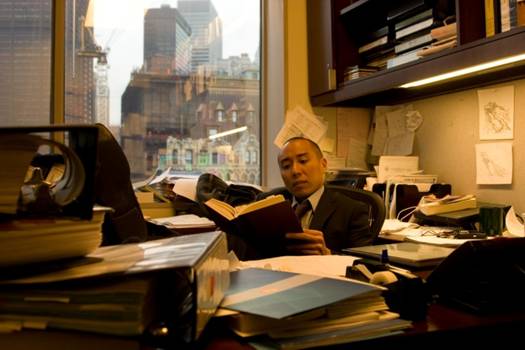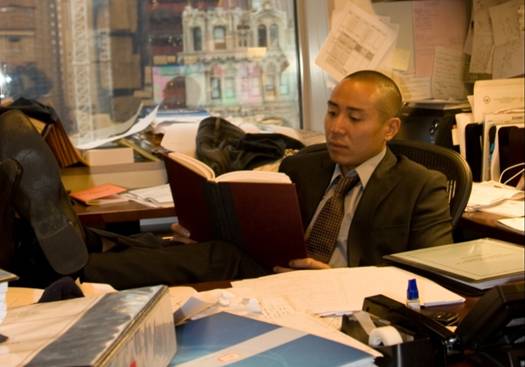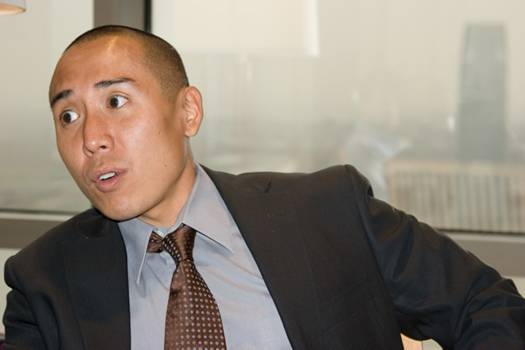Given the economy, most news from Wall Street is bad. Very bad.
Meet Eugene Lee, a mid-level associate at a Top 40 law firm on Wall Street who succeeds in business by being real, honest, and kind. Good news.
He practices what he calls Positive Intent, which he describes as a fundamental presumption in favor of another person - so long as that person is not giving off an evil or unsavory vibe. He is committed to a psychological approach that communicates respect and appreciation at the most basic level.
In Eugene's words, "It's simply what we learned or should have learned when we were little kids. It's what the world's wisdom and faith traditions encourage us to do." While this may be the way our mothers told us to be, it is something easily forgotten in the hustle and bustle of modern life, particularly in the fast-paced and stressful corporate world.
In Eugene's opinion, having the habit of positive intent is immensely useful in his practice as a Wall Street lawyer -- as well as in the rest of his life. He maintains that one is the direct beneficiary of having a positive intent towards others -- not just psychologically and physiologically, but professionally as well.
Eugene explains, "We all know from experience that when you're self-conscious, you're less effective. Whether you're giving a speech, playing the guitar, or sitting in the batter's box waiting for the next pitch, being self-conscious makes you nervous, hesitant, unsure.
"The mindset of positive intent, however, focuses on the task -- or person -- at hand. Instead of thinking, How am I doing?, you think, How can I add value? If you're in a meeting with a client and the positive presumption has kicked in, you're not focused on how you're doing in that deleteriously self-conscious way.
"Instead, you're focused on adding value to that meeting, on connecting with and communicating with your client. The more focused you are on giving your full attention to the client and the matter at hand, the less you think about how you're doing in front of the client and the more natural and at ease you are.
"And the more natural and at ease you are, the more natural and at ease the client is, and the more rapport and trust there is between you."
Eugene's view is that it is not about getting people to like you. It is about getting yourself to like them (so long as they are not giving off unsavory vibrations, whatever those may be).
"Don't we all find that we're positively predisposed to people who really, really like us? Generally, if you have very positive feelings toward someone, that person will be more likely to reciprocate positivity toward you and will be more likely to want to help you.
"This is so elementary it's childish, I know. And obviously, this doesn't apply to everyone. Some people are deeply unevolved and rooted in being unhappy and miserable, and nothing you do can change that."
Related to this, Eugene invokes the Pygmalion effect (also called a self-fulfilling prophecy). To a great extent, it holds, if we are treated as if we were a certain way (e.g., smart or stupid), we will act - and even become - that way. This concept is identified in texts from ancient India and Greece.
Eugene referenced Robert Rosenthal and Lenore Jackson's experiment in San Francisco (1963-1964) that demonstrated that when teachers were led to expect enhanced performance from certain children, those children indeed exhibited such enhancement.
Rosenthal and Jackson gave all of the children in an elementary school class a test, and told the teachers that certain of the children were unusually intelligent, when in fact they were merely average.
Rosenthal and Jackson returned at the end of the school year and tested the same class again. The children who had been singled out as unusually intelligent had improved their scores far more than the other children.
Accordingly, treating people as if they were honest (or competent, kind, etc.) will influence them to become honest (or competent, kind, etc.). [See Pygmalion in the Classroom].
While he was in law school, Eugene assumed he would bomb in the business world because he is so transparent and unable to hide his feelings. His face is an open book. If he knew how to play poker, he would be terrible at it. He wondered how he would be able to succeed in a competitive world of bluffs and feints, manipulation and deception.
It is actually because of his honesty and energy that his interactions and encounters with others take place in a space of respect and integrity. He finds that being transparent, coupled with the ingrained habit of positive intent, serves him much better than cunning and guile.
Big law firm litigators are not known for their interest in Eastern Thought or their spirituality. If you spend an afternoon with Eugene, you will hear about varied topics ranging from Krishnamurti to Dale Carnegie to Richie Davidson's research on neuroscience and meditation.

Eugene appears unfazed, even amused by Wall Street.
Eugene is calm and tranquil, in spite of the financial loss and uncertainty around him. Sitting in his office, his back to the World Trade Center pit, listening to what sounded to me like Gregorian chants, and surrounded by boxes and binders of depositions and trial transcripts, Eugene appears unfazed, even amused.
"These are certainly troubling and uncertain times. The normal response to the bad news we read every day is fear and anxiety. But what comes to mind is what Viktor Frankl wrote in Man's Search for Meaning: 'Everything can be taken from a man but one thing: the last of human freedoms -- to choose one's attitude in any given set of circumstances, to choose one's own way.'
"Frankl came to see the truth of this in the most dehumanizing and abominable of circumstances, in the hell of the Holocaust. It helps me to know that I have the ability to choose my attitude in the face of circumstance."

Enjoying a sunny day along the Hudson River.
As a mid-level associate, Eugene creates and delivers workshops on "soft skills" at his firm for summer associate interns and incoming first year associates. Soft skills refers to non-technical skills which include our ability to connect with others, social graces, communication skills, and empathy.
"I share some very elementary things I learned from my own life and various sources like the Dog Whisperer and other animal trainers, Robert Cialdini, neurolinguistic programming, and the world's wisdom traditions."
In his workshops, Eugene discusses how we are constantly communicating to the world who we are, through body language, through our psychological state. The vast majority of communication is non-verbal. What we say does not communicate nearly as clearly as who we are. Thus, the emphasis of Eugene's workshops is on attitude, purpose, and body language.
Conversations with Eugene range from Thomas Friedman's The World is Flat to Paul Ekman's Emotions Revealed. He tells me that it was through reading the work of Paul Ekman, a professor of psychology and the world's foremost expert on facial expressions, that he came to see emotional transparency as a strength, and not a weakness.
Dr. Ekman has studied and catalogued the facial muscles and facial expressions, correlating the most meaningful expressions to what they mean in terms of emotion. He has consulted the CIA, FBI, and other intelligence agencies on lie detection.
What Eugene found especially useful was Dr. Ekman's assessment of the Dalai Lama, whom Dr. Ekman first met at a conference between neuroscientists, psychologists, and Tibetan Buddhist monks in 2000.
Dr. Ekman had been curious about the Dalai Lama, as he had heard about the visceral effect he had on those who met him. Even skeptics and critics of religion were deeply affected by his presence and energy.
Dr. Ekman marveled that he had never encountered a face like the Dalai Lama's, whose face was the most expressive he'd ever come across and whose facial muscles were as supple as those of a person in his twenties.

Finding peace amidst the hustle and bustle of the corporate world.
Not only did the Dalai Lama use his facial muscles more dynamically than anyone Dr. Ekman had ever seen, the Dalai Lama's face was as guileless as that of a young child. Emotions express themselves across the Dalai Lama's face with complete transparency, displayed openly and with no shame, no self-consciousness. He is happy.
Eugene has also found, to his dismay, that many of the lawyers and other corporate professionals that he knows are unhappy. The proliferation of anxiety and depression in the corporate world is a matter of deep interest and concern to him.
While peace and contentment might seem easier to attain away from the concrete canyons of New York City, he believes that it is attainable anywhere. Exercise and meditation help. Unlike some of the lawyers and corporate professionals he knows, Eugene seems happy.
His take on happiness, however, is that it is a side effect, a by-product, of living a meaningful life in combination with fortunate circumstance. "I don't expect to find happiness by pursuing more money or career advancement. I think happiness finds me when I live a life of purpose and meaning, and circumstance cooperates."
"When most people talk about pursuing happiness, I think they're talking about the pursuit of pleasure. Pleasure is on a continuum with pain and boredom. And I don't think you'll reach real happiness on that path; you'll just find the alternations of pleasure, pain and boredom."

Taking care of the body with regular exercise.
Ten years ago, Eugene took one year off to travel Latin America. Living along the way in six countries, he spent some of the time living in an old Volkswagen van with a friend from New York, a man from California, a woman from New Zealand, a woman from England, and a dog from Costa Rica.
His travels through South America ended in sickness and pain when he contracted Oroya fever. The infectious disease, from a sand fly bite in the mountains of Peru, has a mortality rate exceeding 40%. Eugene went undiagnosed in Peru, Bolivia, and the U.S. for many months.
The illness was a difficult and formative experience for Eugene. The acute phase involved headache and fever -- 24 hours a day for one month -- with nerve pain and chills.
The acute phase of the disease affects the motivation sector of the brain and renders many of its victims apathetic. That was especially so in Eugene's case. He found himself to be largely indifferent to his condition.
Several weeks after a misdiagnosis of typhoid fever and antibiotic treatment that alleviated the symptoms of the acute phase, the secondary phase ensued.
The indifference with which Eugene experienced the acute phase of the disease was replaced with horror as he watched his body break down. Eugene developed an eruptive skin condition -- tiny red spots that grew into horrendous wart-like growths -- coupled with numbness in his arm, endless muscle spasms throughout his body, and rapidly blurring eyesight.
After he was correctly diagnosed, Eugene responded to several months of antibiotics and recovered. "I gained so much from that experience. I grew up a lot during that dark time."
"I spent many, many nights wondering whether I would die soon, whether I'd be paralyzed, or blind, or permanently disfigured. It's not exactly commonplace to spend many months contemplating the frailty of the body, the complete insecurity and instability of life, the nature and meaning of suffering."
Born in Chicago of Korean ancestry, Eugene came to New York to study law at N.Y.U. His thoughts on the positive intent with which he lives his life are particularly timely given the recent negativity on Wall Street.
Photos courtesy of Peter Ruprecht. Edited by Karen F. Davis.

